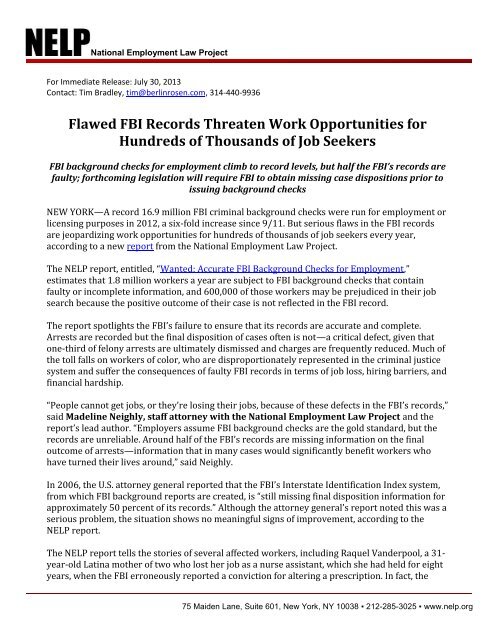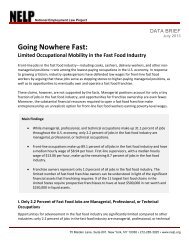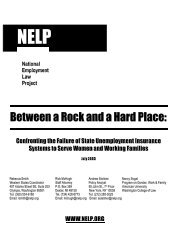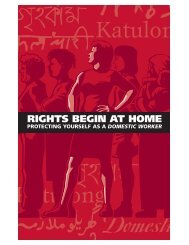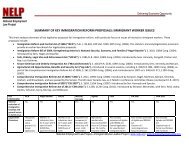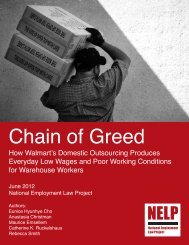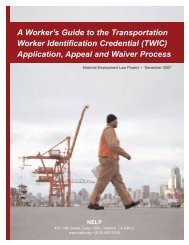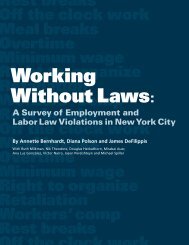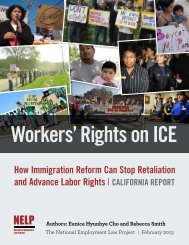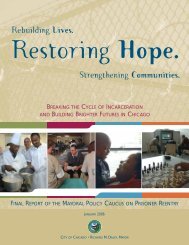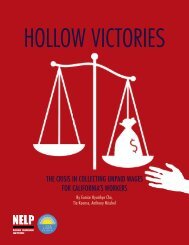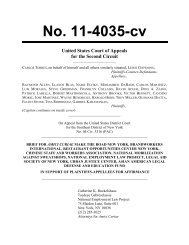National Employment Law Project
National Employment Law Project
National Employment Law Project
Create successful ePaper yourself
Turn your PDF publications into a flip-book with our unique Google optimized e-Paper software.
<strong>National</strong> <strong>Employment</strong> <strong>Law</strong> <strong>Project</strong><br />
For Immediate Release: July 30, 2013<br />
Contact: Tim Bradley, tim@berlinrosen.com, 314-440-9936<br />
Flawed FBI Records Threaten Work Opportunities for<br />
Hundreds of Thousands of Job Seekers<br />
FBI background checks for employment climb to record levels, but half the FBI’s records are<br />
faulty; forthcoming legislation will require FBI to obtain missing case dispositions prior to<br />
issuing background checks<br />
NEW YORK—A record 16.9 million FBI criminal background checks were run for employment or<br />
licensing purposes in 2012, a six-fold increase since 9/11. But serious flaws in the FBI records<br />
are jeopardizing work opportunities for hundreds of thousands of job seekers every year,<br />
according to a new report from the <strong>National</strong> <strong>Employment</strong> <strong>Law</strong> <strong>Project</strong>.<br />
The NELP report, entitled, “Wanted: Accurate FBI Background Checks for <strong>Employment</strong>,”<br />
estimates that 1.8 million workers a year are subject to FBI background checks that contain<br />
faulty or incomplete information, and 600,000 of those workers may be prejudiced in their job<br />
search because the positive outcome of their case is not reflected in the FBI record.<br />
The report spotlights the FBI’s failure to ensure that its records are accurate and complete.<br />
Arrests are recorded but the final disposition of cases often is not—a critical defect, given that<br />
one-third of felony arrests are ultimately dismissed and charges are frequently reduced. Much of<br />
the toll falls on workers of color, who are disproportionately represented in the criminal justice<br />
system and suffer the consequences of faulty FBI records in terms of job loss, hiring barriers, and<br />
financial hardship.<br />
“People cannot get jobs, or they’re losing their jobs, because of these defects in the FBI’s records,”<br />
said Madeline Neighly, staff attorney with the <strong>National</strong> <strong>Employment</strong> <strong>Law</strong> <strong>Project</strong> and the<br />
report’s lead author. “Employers assume FBI background checks are the gold standard, but the<br />
records are unreliable. Around half of the FBI’s records are missing information on the final<br />
outcome of arrests—information that in many cases would significantly benefit workers who<br />
have turned their lives around,” said Neighly.<br />
In 2006, the U.S. attorney general reported that the FBI’s Interstate Identification Index system,<br />
from which FBI background reports are created, is “still missing final disposition information for<br />
approximately 50 percent of its records.” Although the attorney general’s report noted this was a<br />
serious problem, the situation shows no meaningful signs of improvement, according to the<br />
NELP report.<br />
The NELP report tells the stories of several affected workers, including Raquel Vanderpool, a 31-<br />
year-old Latina mother of two who lost her job as a nurse assistant, which she had held for eight<br />
years, when the FBI erroneously reported a conviction for altering a prescription. In fact, the<br />
75 Maiden Lane, Suite 601, New York, NY 10038 ▪ 212-285-3025 ▪ www.nelp.org
charge had been dismissed and sealed six years earlier. After losing her job, Ms. Vanderpool was<br />
unemployed for four years.<br />
“I lost four years. I lost everything, including my confidence. I’m just now able to contribute<br />
again and support my family, but I could have been so much farther in my career,” said<br />
Vanderpool. Other case stories featured in the report include a port worker denied security<br />
clearance because his FBI background check failed to note that a misdemeanor arrest from 15<br />
years ago did not lead to a conviction.<br />
African Americans are especially disadvantaged by the faulty FBI records system, given that they<br />
are 14 percent of the U.S. population but account for 28 percent of the nation’s arrests, many of<br />
which never lead to conviction. This disproportionate impact was starkly illustrated when the<br />
Transportation Security Administration screened two million workers for clearance to work at<br />
the nation’s ports after 9/11. African-American port workers were more than four times as likely<br />
as whites to challenge the accuracy of their FBI records in appealing the denial of a security<br />
clearance.<br />
“The seal of the FBI supposedly marks these records as official, legitimate, and trustworthy, but<br />
that’s just not the reality,” said Neighly. “Everyone suffers when the records are wrong.<br />
Employers and licensing agencies lose out on qualified workers or suffer delays in filling<br />
positions, but undoubtedly, it’s the workers who are most hurt by these faulty records. And right<br />
now, the burden falls on the workers, not the FBI, to track down the verifying documentation so<br />
they can challenge the denial of a job. It should be the FBI’s responsibility to keep its records<br />
accurate.”<br />
NELP says the FBI already has the capability to ensure its records are complete and accurate<br />
before releasing them for employment and licensing purposes. When the FBI receives<br />
background check requests for gun purchases, it contacts the appropriate federal, state, and local<br />
agencies to obtain any missing disposition information, and is able to clean up two-thirds of<br />
faulty records within just three days of the request. Among its recommendations, NELP is calling<br />
for legislation requiring the FBI to obtain missing disposition information prior to sending<br />
background checks for employment and licensing purposes, as the Brady <strong>Law</strong> requires for gun<br />
purchases.<br />
Two bills soon will be introduced to address the issue. One, sponsored by Rep. Bobby Scott (D-<br />
VA), the ranking Democrat on the House Judiciary Committee, seeks to clean up incomplete FBI<br />
background checks for employment in all cases, and enjoyed bipartisan support when last<br />
introduced. The second, sponsored by Rep. Keith Ellison (D-MN), focuses on correcting the<br />
records for employment with the federal government and federal contractors.<br />
"This important report illustrates the many examples of the devastating impact that faulty FBI<br />
criminal background checks have on employment and licensing opportunities,” said Rep. Scott.<br />
“Unfortunately, many deserving workers who are qualified for the positions they are applying for<br />
are being denied employment consideration because of faulty FBI records."<br />
2
“Finding a job in this economy is already hard enough,” agreed Rep. Ellison. “No one should lose<br />
the chance to work because of an inaccurate background check. The Accurate Background Check<br />
(ABC) Act fixes this for Americans applying for federal jobs.”<br />
The report also calls on the FBI and the Department of Justice to take immediate corrective steps<br />
that do not require legislation. These measures include accepting and maintaining updated<br />
criminal history information from states and other agencies that can be readily accessed by the<br />
FBI, enforcing current regulations that would go a long way to improve the reliability of the<br />
records, and actively monitoring and reporting information on the impact of the faulty records to<br />
ensure greater transparency and accountability over the current system.<br />
DOWNLOAD THE REPORT: “Wanted: Accurate FBI Background Checks for <strong>Employment</strong>”<br />
###<br />
The <strong>National</strong> <strong>Employment</strong> <strong>Law</strong> <strong>Project</strong> is a non-partisan, not-for-profit organization that conducts<br />
research and advocates on issues affecting low-wage and unemployed workers. For more about<br />
NELP, visit www.nelp.org.<br />
3


